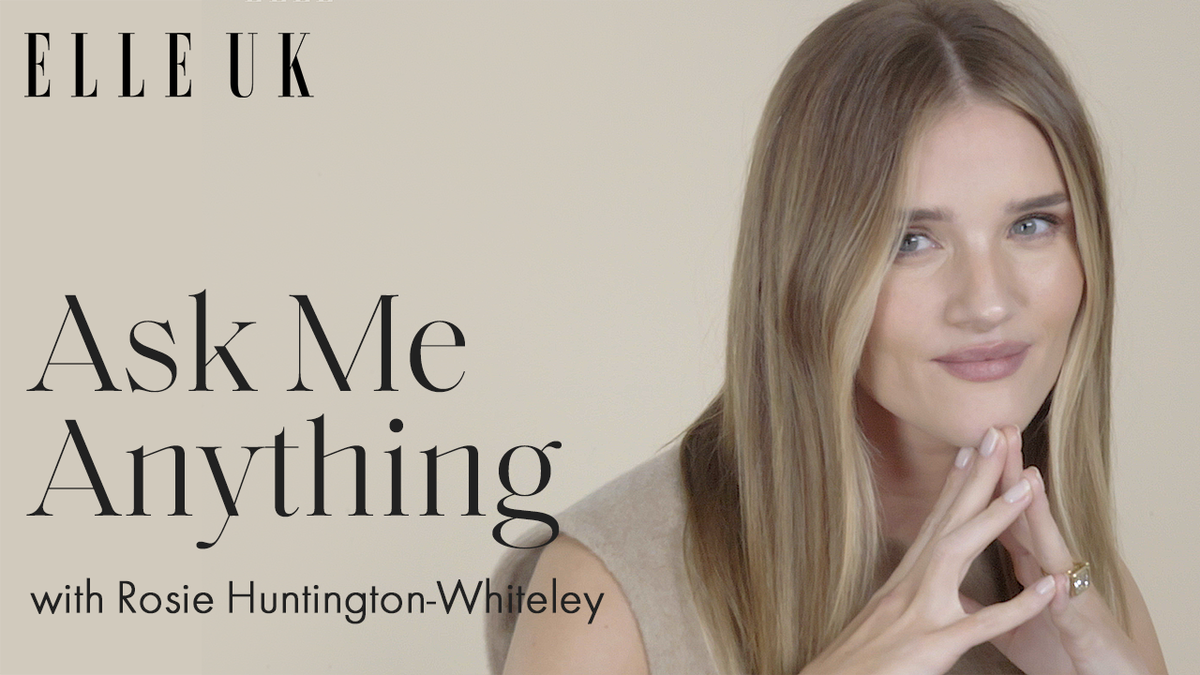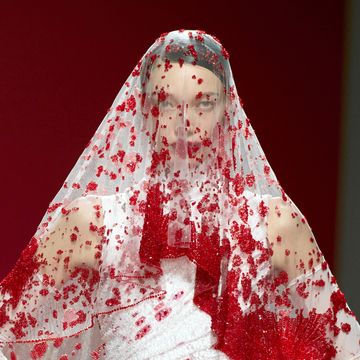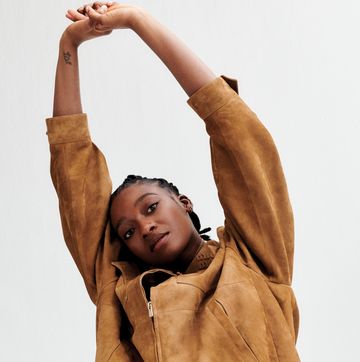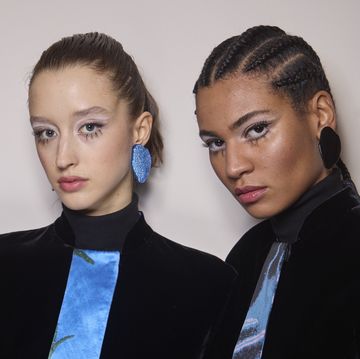There were mutterings, even in the glory days, but the party was too loud for them to really be heard. Suddenly the startup world was female-led, female-friendly, female-focused. After years of looking fruitlessly, furiously, at the unsmashed glass ceiling, women in business decided to paint it pink instead.
The Wing opened its first all-female members’ club space in Manhattan in 2016, growing to 11 locations serving 10,000 members in the US and the UK. If you were visiting The Wing, you could wear your dress from Reformation, fresh from its 2012 relaunch, singing sweetly about its ethical manufacturing practices. That dress was possibly first spotted on one of many female-focused websites that blended fashion with feminism and mental health advice – Refinery29 and ManRepeller among them. An Away suitcase, debuted in 2016, provided something to pack it all up in.
Each of those companies had a charismatic female founder. Even if you weren’t a customer, these women were suddenly everywhere, styled and smiling and telling their success stories. The naysayers mostly focused on price: these websites were free to read, but everything else required a significant disposable income. Was it really inclusive? But these comments were eclipsed by the overall rosy glow. Here was the representation we’d all been clamouring for.
It was the ‘golden age for women in power’, The Wing founder Audrey Gelman told The Washington Post of the moment the company launched its first space, when it still looked like Hillary Clinton would be the 45th US president.
Clinton wasn’t the only woman forced to concede a powerful position. In one week of last June, as the Black Lives Matter movement gathered more strength, Gelman stepped down from her role, publicly apologising for ‘leadership mistakes’, as did Refinery29’s Christene Barberich, who wrote on Instagram: ‘I’ve read and taken in the raw and personal accounts of Black women and women of colour regarding their experiences inside our company. What’s clear […] is that R29 has to change.’
Reformation’s Yael Aflalo, and Jen Gotch of clothing company Ban.do, resigned around the same time, for similar reasons. In the same month, Leandra Medine Cohen moved away from ManRepeller, issuing an Instagram mea culpa for ‘failing to deliver’ on her mission. And Shannon Spanhake left Cleo, a company designed to help working parents, when it was revealed she’d fabricated her professional background, taken six years off her age and created a toxic workplace.
In December 2019, Away’s Steph Korey resigned as CEO after a report by The Verge exposed, again, a ‘toxic workplace’ and ‘a culture of intimidation and constant surveillance’. (She later returned as co-CEO before announcing in July that she would step down again.)
Men in senior positions also stepped down in 2020. Reddit’s Alexis Ohanian – often found cheering as his wife Serena Williams wins tennis games – left his company’s board so he could be replaced by a non-white board member. CrossFit’s Greg Glassman resigned after saying that he wouldn’t mourn for George Floyd. Adam Rapoport, editor-in-chief of US magazine Bon Appétit, went after staff spoke out about discrimination and a picture circulated of Rapoport and his girlfriend, both white, dressed as stereotypical Puerto Ricans for a fancy-dress party.
But, Rapoport aside, male resignations attracted much less attention. Meanwhile, the death of the girl boss was analysed in countless articles. Sometimes the focus was collective, sometimes on individual companies.
Screenshots of Steph Korey’s demands on staff circulated on Twitter. Gelman issued an apology on Instagram. The general tone of the cultural response was one of shocked glee, as if each founder was Regina George and the buses just kept on coming.
It’s also worth noting wild disproportions behind these numbers – simply, there are far fewer women with senior positions to resign from. In the US, where these changes took place, only 14% of startups have a female CEO. In the UK, female-founded companies secured just 16% of equity deals provided by venture capital in 2018. A US study of the same year published in the Journal of Management showed that female CEOs were far more likely to be fired than their male counterparts, even if the company was performing well.
Should 2020’s fallen women have stayed in their roles? Probably not. Did they deserve to pick up a disproportionate amount of attention for their failures? That’s where it gets complicated…
The women in question are alleged to have behaved badly or, at the very least, thoughtlessly. There is a real need to address inequality and damaging work cultures. But the invisible hand of sexism was also present, as were the usual questions about money: who has it and who doesn’t, and what that means. So, how does this break down?
First, there was betrayal. Every brand where the female CEO stepped down traded on their ethics, either explicitly, such as The Wing, or implicitly, as Away did. They were supposedly feminist companies run by supposedly feminist women and, between them, they promised everything from ethical supply chains to mental-health support.
‘There’s a metaphor used in marketing. It’s called brand-as-person,’ says Cleopatra Veloutsou, professor of brand management at the Adam Smith Business School, University of Glasgow. ‘We give brands a character in the same way that we do with humans, ascribing a social class, values and so on. There’s also recent research that shows, for firms based around one entrepreneur, the company will take on their personality: they will make decisions as though they were the brand, so the brand then becomes consistent with the characteristics that person has. As consumers we look for brands that share our values. They form part of our emotional life.’
So, when brands fail to live up to the ethical standards that first made them appealing, we feel betrayed in the same way we would if a friend lied to us.
‘There’s a very real emotional disappointment when we feel that we’ve been sold a line,’ says Catherine Connors, a California-based serial entrepreneur, currently the League of Badass Women CEO. ‘I may be overstating it, but part of the reason this [feminist] marketing works is that we really want to hear it, to hear that we can do it, can chase our dreams, because we haven’t been hearing it for – relatively – very long.’
This leads, says Connors, to elevated expectations of women. But, she continues, women are also ‘expected, for the most part, to use a feminist lens or a female empowerment angle, because a business opportunity is recognised. Look at Away. It’s a suitcase brand, but nothing about suitcases screams feminist… and no one cares if [a male] CEO is rude to his employees.’
Male leaders attract criticism too, of course, but rarely the same absolute censure that female CEOs get. WeWork attracted billions in investment, never made any money and CEO Adam Neumann was forced to step down just before the company made 2,400 of its staff redundant. But he still walked away with a payout of almost $1.7 bn.
Peter Thiel, who was one of the founders of PayPal, has funded former President Trump and is open about his right-wing political views. While this puts him at odds with Silicon Valley’s largely liberal outlook, he still holds a lot of sway in the technology world.
Facebook has been criticised for everything from dismissing employee concerns, killing the media – even destroying democracy: Mark Zuckerberg, who strongly contests any such claims, remains in place. There’s a freedom for men to fail that’s not extended to women.
‘Women do trend more towards ethical and socially responsible businesses than their male counterparts,’ says Tara Sabre Collier, who specialises in gender-led investing. There are many reasons for this, partly, as Sabre Collier points out, because women are more likely to experience inequality in the world and wish to change it. But selling feminism is also a way of attracting investment. We know that consumers respond well to feminist marketing. So it’s a clever move, whether genuine or cynical, for a woman going up for venture capital funding to stress her ethical credentials. But having principles baked into your business model means that the world expects more from you, and so it becomes much easier to fail.
‘Venture capital money can come with weird strings,’ says Sarah Drinkwater, director of beneficial technology at philanthropic investment firm Omidyar Network. ‘Look at The Wing. It tried to be all things to all people. To some, it was a venture-backed startup. To others, it was a social justice organisation. It was not clear about its mission. For many founders, there’s a core tension that’s hard to overcome.’
Several of the women interviewed for this piece said that as venture capital companies mostly consist of white men, people who do not match the pattern find it difficult to convince funders that their ideas have merit.
June Angelides has worked as a banker, an entrepreneur and is now an early-stage tech investor. She says women are often not taken as seriously: ‘As a Black woman, I am conscious of the fact that products for the Afro-Caribbean society may not get as much investment. That’s a large market to miss out on. We need to invest in women, because it’s the only way we will break this cycle of tech products that are by men, for men.’
When investors do meet with women, they are often the women who are most like them: white and already wealthy. These women then become poster girls for female success.
‘The reason these women are visible is because they’ve raised a certain amount of money,’ says Drinkwater. They are also photogenic and often operate in retail and lifestyle spaces that consumers can relate to. They ‘became the very public faces of their companies’, Maria Aspan wrote in an article for Fortune. ‘In a way that’s more common if you’re selling leggings than, say, cloud-based enterprise software.’
This increased visibility means that the ‘female founder’ stereotype gets compounded and the patterns repeat.
A high profile also means that when a female founder fails, she fails in public: it isn’t just the business community watching. Part of this is understandable: we feel it is right, fair, for the ‘mean girl’ to be taken down: we all become Janis Ian, not realising this delight in failure makes us mean, too.
‘We have an immense appetite for watching women suffer,’ says Drinkwater. ‘Look at our films, our music.’
‘It has to do with the way we hold women accountable in public, capitalist, democratic spaces,’ says Connors. ‘In a way that we don’t with men. For thousands of years, women have been confined to the private sphere. We have so much socially ingrained self-doubt about being in the public sphere, so we look at women who move into it with some degree of suspicion, even hostility.’
There’s also a disconnect between those supposedly feminine traits – compassion, empathy, nurture – and those that we traditionally associate with CEOs: drive, ruthlessness, a willingness to break rules.
Cleo, the company run by Shannon Spanhake, has a website full of smiling parents and children, telling employers it will help them ‘take care of your modern workforce’. Contrast this with a slide Spanhake showed staff. Forbes reported that one of the bullet points told them to ‘expect to work 50 to 60 hours a week’.
‘There’s a cult of the male founder where we expect them to have this Peter Pan boyish quality,’ says Connors. ‘They’re rebels, right? They defy the system – Han Solo, Tony Stark – refusing to be grown-ups and profiting from it. The problem is that kind of entrepreneurial hero’s journey doesn’t apply to women. They’re expected to be Wendy, not Peter, making sure everything is maintained and managed behind the scenes. Look at Sheryl Sandberg compared to Mark Zuckerberg.’
Silicon Valley has become our dream factory, edging out its neighbour from the south, Hollywood. It shapes our thoughts, our desires, our politics. Even the language is mythic: investors are ‘angels’, startups valued at $1 bn or more are ‘unicorns’, rapid growth is termed ‘blitzscaling’. But are we expecting too much when we expect business leaders to be role models as well?
‘We are looking for heroes in all the wrong places,’ says Carl Rhodes, co-author of CEO Society: The Corporate Takeover of Everyday Life. ‘With neoliberalism in the 1980s and 1990s, business became a lot more prevalent. The idea that private enterprise would lead us to a brighter, shinier future was linked to the political agenda… Do we want to look for heroes in that realm of life, or is there a broader sense of what we might look for socially, politically and personally?’
In 2017, the Me Too movement showed men that the old ways would no longer work. Last year, Black Lives Matter turned the same spotlight on white privilege. The demands of the Covid-19 crisis and the increasing pressure of climate change mean that caring is no longer just for activists.
The girl boss was almost set up to fail and we enjoyed watching her do so. But she shouldn’t be excused because the system around her was wrong. The female founders started marking out a path, a different way of doing things. That path shouldn’t be abandoned just because they failed. We need to expect more from women and men. We should learn from the girl boss, even as we bury her.
This article appears in the April 2021 issue of ELLE UK.
Like this article? Sign up to our newsletter to get more articles like this delivered straight to your inbox.
In need of more inspiration, thoughtful journalism and at-home beauty tips? Subscribe to ELLE's print magazine today! SUBSCRIBE HERE


















